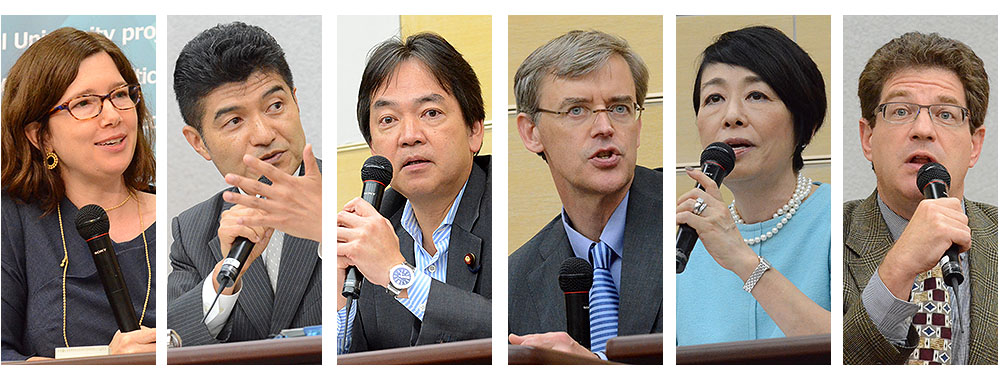Is North Korea’s nuclear weapons development a sign of Thucydides Trap?
Mon, Sep 11, 2017-
Tags
International symposium on nuclear revolution, international politics, and U.S. foreign policy
Waseda University’s Center for Positive/Empirical Analyses of Political Economy of MEXT’s Top Global University Project welcomed Professor James D. Fearon from Stanford University to present his most recent views on nuclear revolution, international politics, and American foreign policy in the Northeast Asian region at an international symposium held on July 29th. Professor Fearon has been the leading scholar in the field of international relations since the 1990s, who indeed has transformed the entire academic research on inter-state wars as well as domestic conflicts.

Professor James D. Fearon from Stanford University
North Korea’s intercontinental ballistic missile (ICBM) test conducted for the second time on July 28, just a day before the symposium, exemplifies the ever-heightening threat of nuclear crises for the Northeast Asian region and even against the United States. This situation is altering the fundamentals of international politics, and an elaborate discussion on the current state of international affairs, especially the US involvement in Asia, which obviously has a salient policy relevance, is increasingly warranted.
In the field of international relations, concepts such as the “balance of power,” which focus on the sheer distribution of power among states, are still widely used. For example, Graham Allison, a famous Harvard Professor, has advanced a sensational “prediction” that the United States and China are destined to go to war, calling their tension as the “Thucydides Trap,” a metaphor which describes the relationship between ancient Sparta and Athens.
Pitted against such a view, Professor Fearon stated critically that there is no “Thucydides Trap” in a nuclear age, because the nuclear revolution has fundamentally changed the nature of politics among the major powers. Professor Fearon stressed that the conventional balance of power politics has faded away and added that, although some competitions between major powers may still exist, the arms race has ended in its significance and the way alliances work has also changed in its effect. In a nuclear world, relative military capabilities, such as the number of tanks, do not matter anymore, at least not in the same way as before. Accordingly, the essence of alliance politics has begun to shift away from the aggregation of conventional military capabilities to the prevention of nuclear proliferation.
“Policy makers as well as international relations scholars have continued to grasp security issues of Northeast Asia in pre-nuclear terms, and thus seem to have misunderstood the regional political environment. In a nuclear world, a major power can easily ensure its territorial integrity and basic political autonomy, albeit some costs and risks remaining, such as those of losing control of nuclear weapons and increased odds of nuclear terrorism in big cities. For Northeast Asia, the question is whether the frictions based on nationalism can be contained small enough to avoid serious crises and arms race, which might foster a stronger appetite for states to develop nuclear weapons.”

From the left: Marisa Kellam (Professor, Waseda University); Narugshige Michishita (Professor, National Graduate Institute for Policy Studies); Keichiro Asao (Member of the House of Representatives); James D. Fearon (Professor, Stanford University); Yuko Ando (Journalist); Kenneth Schultz (Professor, Stanford University)
Following the lecture, a roundtable discussion was held, and Keichiro Asao (member of the House of Representatives), Yuko Ando (journalist), Narugshige Michishita (Professor, National Graduate Institute for Policy Studies), and Kenneth Schultz (Professor, Stanford University) were asked to share their views on the theme of the symposium.
Michishita offered his insight that North Korea is trying to achieve proactive objectives by using nuclear weapons, both to bargain with the United States and other countries and to show off its advantage vis-a-vis South Korea. Asao, in his discussion on the US commitment to Northeast Asia, stated that the United States should start drawing clearly where the red line is, and once North Korea crosses it, they should face severe punishment before the tyrant regime actually gains a real capacity to fire nuclear weapons against cities in the United States. Ando pitched in her opinion that the North Korean leader Kim Jong Un most likely does not care about where this red line is because he believes that the only way to be an equal partner of the US is to possess nuclear weapons.
In response to these comments, Ken Schultz, who had just finished teaching an intensive summer course at Waseda, said that, “Nothing has happened because the reality is that there are very limited options for dealing with North Korea. The United States has never faced good or compelling options for coercing a change from this regime. Moreover, the United States right now has a government that I would characterize as nationalists and unstable to a certain extent. So, I am concerned with uncertainties associated with North Korea, as the United States continue its commitment to countries like Japan, South Korea, and elsewhere.”
Professor Fearon concluded the roundtable discussion with the following remarks. “I would definitely love to see a world without nuclear weapons. That’s my first best. But, we are in a situation now where that’s not the first best we can get to tomorrow or in the near future. You can only get to that in a world of happy, healthy, prosperous, stable, relatively open, transparent government. But even then, that doesn’t mean you can’t have intense nationalist disputes between democracies over contested territories. Moreover, nuclear risk becomes higher when you try to disarm or go to zero. It’s not going to work to just hold up your hands.”














